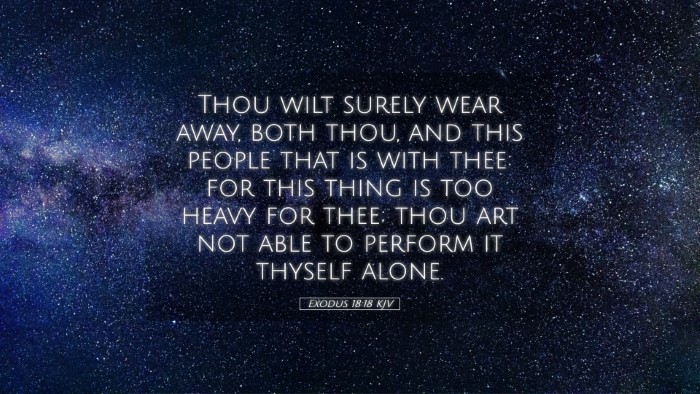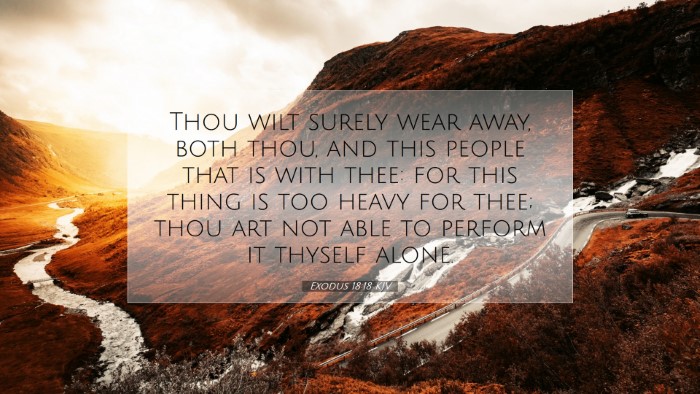Exodus 18:18 Commentary
Verse Context: Exodus 18:18 states, “You will surely wear out both yourself and these people that are with you, for the task is too heavy for you; you cannot do it alone.” This verse comes from the account of Jethro's advice to Moses, addressing the overwhelming burden Moses faced as the leader of the Israelites.
Introduction
This verse highlights a significant moment in biblical leadership and organizational structure within the framework of Israel’s journey through the wilderness. Here, we find Jethro, Moses’ father-in-law, recognizing the unsustainable nature of one man's leadership over a vast multitude. The insights derived from public domain commentaries provide a multifaceted understanding of this verse, focusing on themes of delegation, the necessity of support within leadership, and God's design for communal governance in His people.
Insights from Matthew Henry
Matthew Henry emphasizes that Moses, a man of exceptional faith and duty, was nonetheless overburdened by his administrative responsibilities. Henry points out that the workload was overwhelming not only for Moses but also for the people who sought his guidance continuously. He observes:
- The Danger of Isolation: Henry notes that individual leaders, no matter how gifted, can become isolated and vulnerable when carrying the full weight of responsibility alone.
- Encouragement to Delegate: He advocates for the significance of delegating responsibilities to capable individuals to share the burden effectively, as this model encourages mutual support and strengthens community ties.
- Divine Wisdom through Counsel: Jethro’s counsel is seen as a divine intervention, suggesting that seeking external advice can be crucial in reforming leadership approaches.
Insights from Albert Barnes
Albert Barnes provides a detailed exposition on practical leadership and the implications of Jethro's advice. He elucidates several principles that underlie this passage:
- Truth in Human Limitations: Barnes asserts that no individual is called to perform every task alone. It reflects a profound understanding of human limitations and the necessity for collaboration.
- Establishing Judging Officers: He underscores Jethro’s proposal for appointing officers to judge the smaller matters among the people, which would allow for a more efficient governance structure and alleviate Moses' burden.
- Spiritual Root of Leadership: Barnes also notes that while Jethro’s advice is practical, it doesn’t detract from the spiritual authority God vested in Moses. Guidance must still be sought after through prayer and godly wisdom.
Insights from Adam Clarke
Adam Clarke offers a theological reflection on the responsibilities borne by leaders and the role of divine assistance:
- Comprehensive Leadership: Clarke suggests that effective leadership encompasses not only decision-making but also the nurturing of followers. He emphasizes that leaders must invest in the lives of those they lead.
- Divine Design for Community: He further notes that God designed humanity for community, asserting that sharing burdens is essential for holistic spiritual and physical well-being.
- Moses as a Type of Christ: Clarke invites the reader to view Moses as a typological figure of Christ, where the ultimate burden of leadership and salvation rests upon Him, yet He calls His followers to participate in His mission.
Theological Implications
The lessons from Exodus 18:18 extend beyond mere organizational advice; they touch upon profound theological truths:
- Community in Ministry: The importance of shared leadership in fulfilling God’s mission emphasizes the biblical principle that every believer has a role within the body of Christ (1 Corinthians 12:12-27).
- Delegation and Empowerment: This verse serves as a foundational text for understanding the need for empowerment within the community of faith, where leaders are to raise up others to carry the load (2 Timothy 2:2).
- God’s Provision: Jethro’s wisdom illustrates God’s provision for His people through wise counsel and community structures, ensuring the health and sustainability of their leadership.
Practical Applications for Leaders Today
As we reflect on Exodus 18:18, several practical applications emerge for contemporary leaders, pastors, and church members:
- Recognize Your Limits: Leaders are reminded that recognizing personal limitations is a strength, and it enables them to seek the support and resources needed to fulfill their calling effectively.
- Empower Others: It is vital for leaders to find, train, and empower others to take on responsibilities. By doing so, they nurture growth and create a thriving community.
- Value Wise Counsel: Seek out and remain open to receive counsel. Just as Moses benefited from Jethro’s wisdom, today’s leaders can gain invaluable insights through mentorship and community support.
- Commit to Prayer: Underpinning all activities should be a commitment to prayer, asking for God’s guidance as leaders navigate responsibilities and decisions.
Conclusion
Exodus 18:18 serves as a striking reminder of the communal nature of leadership as established by God. The insights drawn from Matthew Henry, Albert Barnes, and Adam Clarke encourage us to acknowledge our limitations, value one another in ministry, and rely upon God’s divine provision. As we embrace these teachings, may we foster a community that uplifts and empowers all its members, reflecting the very nature of Christ who bears our burdens.


